
10 minute read
Transformative gifts help shape the future
TRANSFORMATIVE PHILANTHROPY has dramatically elevated USF’s trajectory. Generous donors have lent their names to some of USF’s nationally renowned colleges, creating a singular story at USF: how large-scale giving has inspired even more giving, boosted USF’s reputation — and driven economic growth in the Tampa Bay region to new heights.
In fiscal year 2019-20 alone, USF generated a whopping $6.02 billion in economic impact statewide. No doubt the impact of transformative gifts has contributed to this growth. A vibrant university not only attracts industry to our region, increasing the number of high-paying jobs, but also brings life-changing research and discoveries, often brought to fruition by start-up companies and entrepreneurs.
The result is a powerful blend of benefits to the greater community: students educated at the cutting-edge in myriad disciplines, graduates ready to take their places in the businesses that drive the economy, and top medical clinicians who raise the standard of care throughout Tampa Bay.
To achieve all of these assets requires a major investment in the university, and those leading the transformative philanthropic charge over the past 10 years at USF include:
• Carol and Frank Morsani to name the USF Health
Morsani College of Medicine • Pam and Les Muma, ’66, and their naming of the
Muma College of Business • USF President Emerita and Professor Judy Genshaft and husband Steven Greenbaum to construct and name the Judy Genshaft Honors College • Kate Tiedemann and spouse Ellen Cotton to name the
Kate Tiedemann School of Business and Finance on the St. Petersburg campus • Dr. Kiran C. Patel and Dr. Pallavi Patel, whose gifts constructed and named the Patel College of Global
Sustainability • The Taneja Family Foundation to name the Taneja
College of Pharmacy
The list goes on — and so does the cumulative impact of USF’s transformative giving.
“Transformational giving has enormous power to shape the future, whether it’s in expanding opportunities for students or achieving new heights as a university,” says Jay Stroman, senior vice president of Advancement and Alumni Affairs and CEO of the USF Foundation. “That monumental level of generosity has made an immeasurable impact on USF, and benefited the community as well. We’re so grateful for the gifts from these transformational donors, as well as all the donors whose gifts have elevated USF.”
On a recent morning, Dr. Charles Lockwood, senior vice president of USF Health and dean of the Morsani College of Medicine, sat at his desk inside the stunning urban structure that houses the USF Health Morsani College of Medicine and Heart Institute. The Taneja College of Pharmacy is on target to move there in early 2023.
This is a beacon of wellness anchoring the bustling Water Street sector of downtown Tampa, not far from the leading academic medical center of Tampa General Hospital, which enjoys a vibrant partnership with USF Health. The building is named for Carol and Frank Morsani, among the top donors in USF history whose presence exists prominently on the Tampa campus in the Carol and Frank Morsani Center for Advanced Healthcare.
“From my perspective, there are really two types of gifts that are helpful for academic enterprises — particularly in the area of health care,” Lockwood says. “One is through gifts that allow you to build. We have this building I am in because of Frank and Carol’s gift, and that’s extraordinary. This building is an echo chamber that is creating opportunities for other people to give — such as the $10 million
Philanthropists through the years: Left: Kiran and Pallavi Patel, circa 2005.
Right: Clockwise from top left: Pam and Les Muma, Life Members; Steven Greenbaum and Judy Genshaft, Life Members; Manju and Jugal Taneja; Kate Tiedemann and Ellen Cotton, Life Members; and Frank, Life Member, and Carol Morsani.
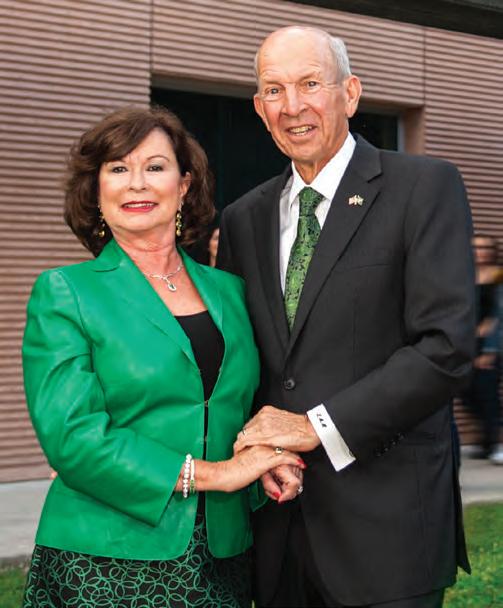
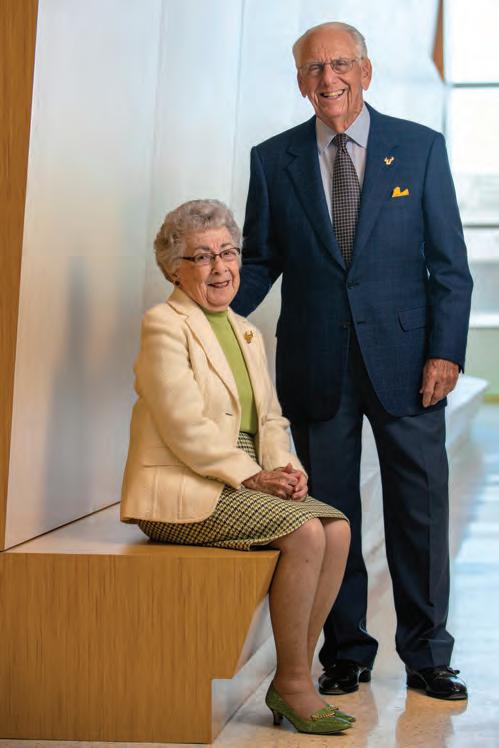

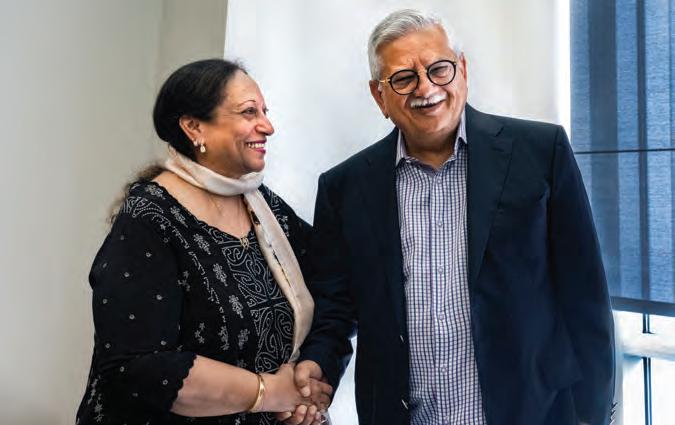
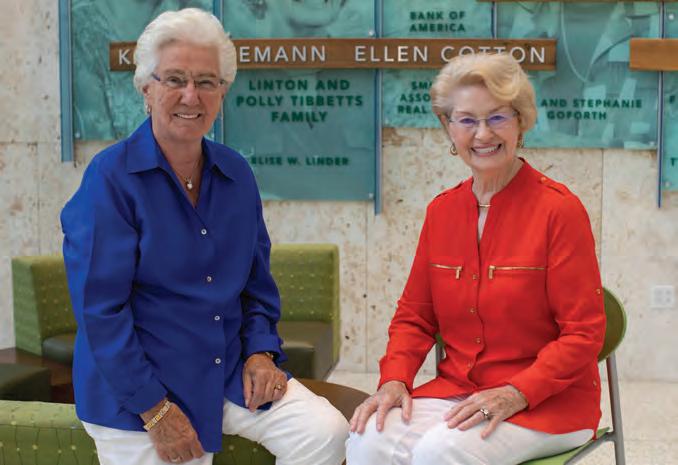

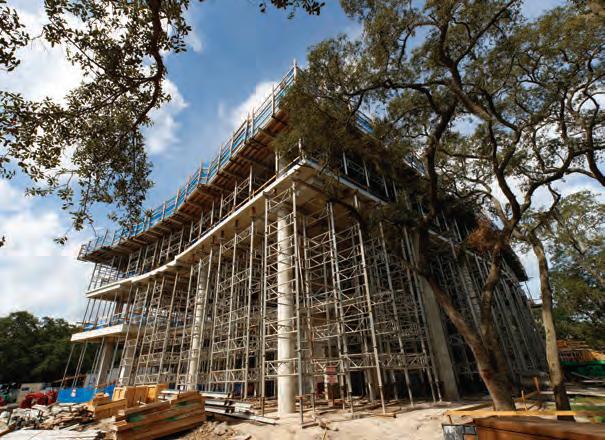
gift from the Taneja Family Foundation to name the Taneja College of Pharmacy — and for us to be able to recruit people.
“It not only provides much-needed space, but it is a beautiful building and a beautiful location. People want to be here. They want to come here as professors and want to come here as students. In that sense, their gift has triggered a virtuous cycle — whatever the initial value of the gift has been magnified many fold by its use.”
The second way gifts make a profound impact in health care, Lockwood explains, is in the area of research. Recruiting researchers who bring in National Institutes of start-up companies and more. Or think of it like this: a million-dollar gift generates $2.3 million in impact. But it costs money to support these researchers. The only way to make up for that is by having our hard-working clinicians donate their own money — or through the generosity of outside donors.
“Donors can have a lasting impact on a medical school and a university by establishing endowed chairs and endowed professorships. The discoveries made by faculty who hold those endowments are a direct benefit to the community and world. It’s a gift to posterity.”
Finally, named gifts, beyond their initial financial impact, also attract world-class clinical scientists who develop world-class clinical programs.
“It’s not an accident that over the last seven years we’ve grown to have five out of the 12 best U.S. News & World Report-ranked medical and surgical specialty programs in the state of Florida,” Lockwood says. “And I predict that over the next decade all of our programs will be ranked as best in Florida.”
What motivates donors to make transformative-level gifts? Frank Morsani explains that attaching his and Carol’s names to a gift was never done out of a desire for acclaim or attention, but to hopefully prompt others in a position to lend a hand — underscoring the key philanthropic concept that giving begets giving.
“As far as Carol and I are concerned, our theory has always been, if you’ll give, then other people will come on board. And they have. That has always been the reason we’ve done things, trying to lead the charge and leave the world a better place.”
Pam and Les Muma are another such pioneering philanthropic couple, whose landmark gift in 2014 named the Muma College of Business. It was and remains a water-
– Charles Lockwood
Health (NIH) grants provides multiple benefits.
“No. 1 is the research itself,” he says. “It could be life-changing. Additionally, it has local economic effect in a major way — $1 of NIH funding generates $2.30 in local economic activity, plus patents, licensing fees, biotech
Above: The Judy Genshaft Honors College is the most recent donor-supported building project, now rising on the Tampa campus.
shed occurrence in USF’s history. “Start with the story of our college,” says Dean Moez Limayem. “The naming of the college put us among the top tier of colleges of business, because you can be very good but if you want to be outstanding, you have to be named. But it also gave us the resources to change the lives of so many students, one at a time, for perpetuity.”
He vividly recalls a concern voiced by the Mumas when it came to naming the college. “They wondered, ‘Oh, would other people think now that you have all the resources you need, and stop investing in students and the college?’ ” Limayem says. “I assured them that would not be the case, and that it would, in fact, inspire others to give. And that is exactly what has happened.”
Among the vast number of examples is Kate Tiedemann’s milestone gift in 2014 to name the Kate Tiedemann School of Business and Finance at the USF St. Petersburg campus, followed by spouse Ellen Cotton’s gift to establish scholarships and name the new building’s atrium. Then there’s Lynn Pippenger, who provided donations to name the Lynn Pippenger School of Accountancy at Muma College of Business in 2015, followed by gifts to name Lynn Pippenger Hall — housing the Kate Tiedemann School of Business and Finance — and, in 2020, a gift to streak of its own. Endowed through generous gifts from Drs. Kiran and Pallavi Patel, the center’s mission is to foster social, economic and environmental sustainability.
“The vision for PCGS,” says Dean Govindan Parayil, “is to make it an incubator for sustainable innovation and a hub for training a new generation of global sustainability graduates.”
Those graduates will have a unique impact on the region, armed with vast knowledge and experience from a groundbreaking program.
It is a dream under construction, a new building taking shape on the Tampa campus that will hold endless possibilities within its striking, modern facade. From the top floor of the Judy Genshaft Honors College, you can peer straight down past columns of steel beams and concrete slabs to the spacious atrium — and imagine the many ways students will be uplifted on each flight from floor to ceiling.
The five-story structure on renamed Genshaft Drive is more than a state-of-the-art, $50-million-plus home to 2,700 Honors students in multiple disciplines, each pursuing academic and creative heights in a facility aiming to be the best honors college in the country. It is a symbol of the power of transformational giving.
At the heart of this philanthropic endeavor, like all of the giving that has propelled USF to new heights in so many areas, is untold impact.
“First of all, consider that there is not one great city in America without a top-notch research university — and we are that university for Tampa Bay and Florida,” Genshaft says. “These Honors College students are multi-talented with multiple interests. They are the future inventors, innovators, risk-takers — and creative thinkers of tomorrow, regardless of their major. And many of them stay in Tampa Bay — contributing to economic development in high-paying jobs and industries that improve our community.”
“The impact that this gift will have is incalculable,” adds Dean Charles Adams, the only endowed honors college dean in the nation. “It’s going to be a very big canvas on which many great ideas will be painted.
“And in a larger sense, this building speaks to the core values of USF. It says something about how much the university cares about its students, and is a tremendous statement about academic excellence at USF. We want to recruit high-ability students from all over the country and world, and this building is a gleaming statement that puts us front and center in recruiting across the nation.”
From that lofty vantage point, it will underscore the power of named colleges — and the impact USF’s transformative giving has had on Tampa Bay and beyond.
– Moez Limayem
endow a deanship at the Muma College of Business.
The impact becomes cyclical, Limayem explained. “When USF’s reputation is elevated, we attract better students, retain faculty and staff, and serve our community more effectively — keeping companies here in Tampa Bay and attracting more companies,” he says. “It’s a full circle — everybody wins.”
The Patel College of Global Sustainability (PCGS), the newest degree-granting college at USF, is on a winning










